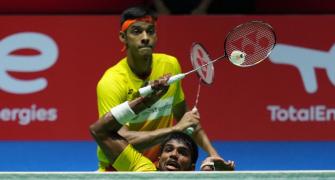Many of the senior editors who listened to Prime Minister Manmohan Singh on Monday found that he wanted to send the message across the nation that he is in charge of the situation in spite of speculation that the Congress is getting ready for a transfer of power. As one senior editor put it, "We met a bold Manmohan Singh, his statements were deliberate and he assured us that he is in command."
He explained that differences amongst his ministers and the party are not necessarily a bad thing.
He said Jawaharlal Nehru and Indira Gandhi's cabinets had many more differences and Dr Singh's cabinet is more cohesive than theirs.
The most important message, one of the editors said, was that the prime minister confidently rubbished all talks of his premature retirement. "He ruled out any possibility of a shift in the power structure soon. Rather, he hinted at a cabinet reshuffle."
He gave the clear idea that he is going to stay. He said categorically, "I am not retiring."
He, also, clarified that his government is not shifting policy dramatically to please left-of-centre activists and environmentalists. Dr Singh's belief in economic philosophy has not changed in spite of his party giving different signals.
Dr Singh reminded editors, who were invited to his Race Course residence, that there are 37 percent people mired in poverty. The prime minister's message was that environmentalism should not be used to perpetuate poverty. Environmental concerns are important but industrial development is equally important.
If Jairam Ramesh got the message through his statement today even the Supreme Court got the prime minister's clarification on the food distribution policy. In a democracy the executive and the judiciary have fixed and well-defined roles. Dr Singh politely said that he does respect the sentiments behind Supreme Court's order to distribute rotting food free to poor people but he would like to see that administration decides the policy about food distribution.
Interestingly, when he said he is not retiring, he also added that he wants younger elements in the cabinet. He wants to look at the options of a reshuffle before the next session of Parliament. This announcement will create political waves in his party.
He expressed the concern that China is becoming assertive but he put emphasis on the fact that both countries would have to live with co-operation while competing with each other. He didn't give any promise on a solution to the Kashmir problem.
He said in a realistic tone, "I can't promise you that I can produce a rabbit out of my hat, the country must learn to be patient," He said that some decisions may be taken when Cabinet Committee on Security meets to discuss Kashmir later this week.
The prime minister listed Kashmir, the pending judgement on title suit of Ayodhya and Maoists as important issues which will have a far-reaching impact.
While discussing Pakistan, he said that when India was not refusing to have a dialogue with Pakistan, it leveraged its advantage with Western countries.
On the issue of corruption he was least convincing. In spite of enjoying a clean political image, his response on charges against telecommunication minister A Raja was weak. He didn't have much to say on corruption, said an editor after the meeting. Also, when questions were asked about Rahul Gandhi, he was evasive. He didn't get into detail.
A senior editor told rediff.com that, "I see shades of Narsimha Rao in him. He is not quitting the job. He talked a lot. He was frank and relaxed except on a couple of issues like corruption charges against some of his colleagues. Good to see that he had clarity on what he is doing. He didn't show any sign of weakness vis-à-vis his party."








